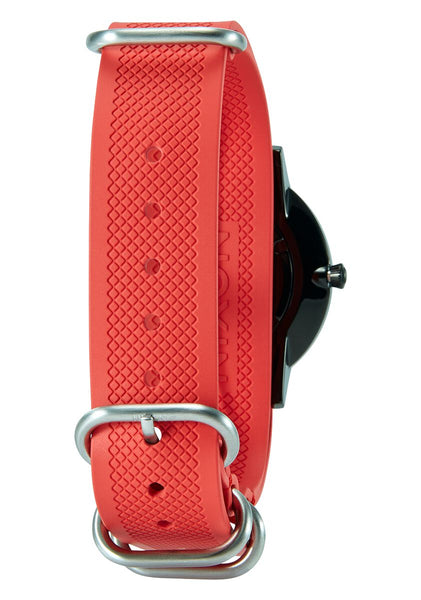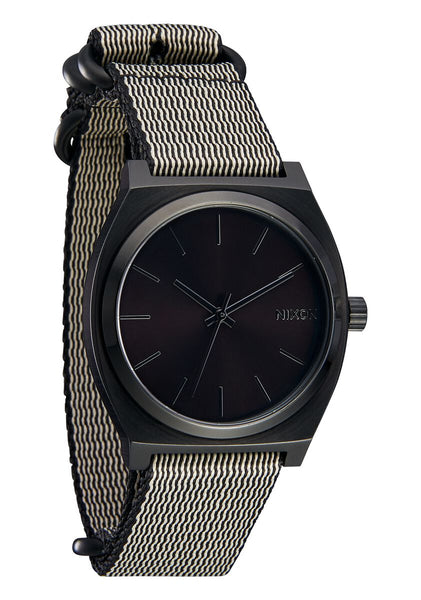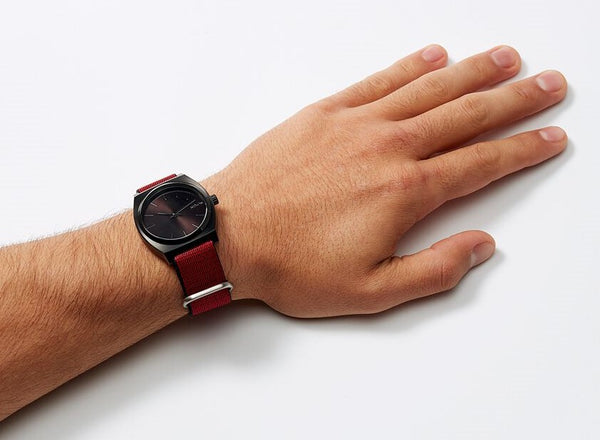NATO Strap Guide | What are NATO Watch Straps?
Even if you don’t know much about watch components, you’ve likely heard of the NATO strap or watch band. If you haven’t, get ready for a crash course in one of the most recognizable watch straps in the world. But like comparing gas station California rolls to Nobu sashimi, not all NATO straps are of the same caliber. In this article, we’ll go over what a NATO strap is, how they work, how to choose a quality NATO band, and finally, how to rock your NATO strap.
What is a NATO Watch Strap?
The British Ministry of Defense introduced the original NATO strap in 1973 as an option for its soldiers to use in the field. It earned the name “G10,” as soldiers looking to get one had to request it via a G1098 requisition form. The “NATO” namesake comes from the NSN (NATO Stock Number) used when ordering the strap. The 20mm nylon band was light, breathable, and kept the wearer’s watch from sliding around their wrist. A favorite among the British Special Forces, the strap became an icon of spartan ruggedness and simple reliability. But it took a different British icon to catapult the NATO strap into superstardom.
In the 1963 James Bond film Goldfinger, Sean Connery checks the time and gives audiences a close-up shot of his watch that features a blue and grey NATO-type strap. Purists will note that the “Bond NATO” isn’t a true G10, but why let facts get in the way of a good origin story? Since then, the NATO band has been a symbol of refinement and style on par with Bond’s Aston Martin cars, in terms of the superspy’s iconic possessions. Once established as “Bond-worthy,” watch lovers everywhere began searching for G10s to use for their own watches. When NATO straps started showing up in military surplus stores, the G10’s popularity began to explode in the mainstream. But it’s not just the band’s aesthetic that makes it so appealing; functionally, the NATO band is a brilliant piece of “less-is-more” design.
The NATO watch strap is a single piece of material that slips between the watch face’s lugs, under the caseback, doubling back on itself, and secures by way of a buckle closure. Because of the “caseback double-back,” the watch stays centered and secure on the wrist. Even if one of the lugs were to fail, the watch would remain on the band. The end of the strap is left intentionally long, giving you the ability to fold that back on itself and doubling the band’s on-wrist security.
To see how to install a NATO strap, check out our step-by-step guide.
NATO Straps: Not All Created Equal
Because there are so many NATO straps on the market, customers need to be careful when choosing one. Putting a valuable watch on a budget NATO band runs the risk of a lost timepiece. The quality of NATO straps varies widely, so it’s crucial to look at a few areas: the strap material and the buckle quality. It’s also essential to make sure the width of the strap you choose matches that of your watch lugs — a poorly-fitted band can cause you just as much heartbreak as a cheaply-made one.
At Nixon, we offer our NATO straps in several different materials, ranging from nylon made out of recycled ocean plastic to dive-ready FKM rubber. Our buckles are of the highest quality and will stand up to daily life bumps and dings with ease. These quality materials come in a ton of different colors, patterns, and even graphics, so no matter your style, there’s a Nixon NATO that lines up perfectly.
How to Wear a NATO Strap
As we’ve mentioned, a watch with a NATO band is one versatile accessory. It can feel at home in just about any setting. Plus, thanks to the accessible price, you can build up a collection of NATO bands to match your mood or occasion. Here are a few suggestions for styling your NATO strap with looks ranging from casual to formal.
Look One: Lazy Sunday
Pull on a pair of jeans or khakis, snag your favorite t-shirt, and match them with a smaller-faced watch with a colorful NATO strap. The low-key outfit lets your timepiece have a bit more of the spotlight and says, “I may have had to pull myself out of bed this morning, but this outfit was by no means thrown together.”
Look Two: Workday Wonder
Business casual does not have to mean boring. A button-up and slacks feel much less like a uniform when you throw on a chronograph with a bold, solid-colored NATO band. After leaving the office, roll up your sleeves and show off your watch at happy hour.
Look Three: Full Court Impress
For formal settings, it’s tough to say no to the striped NATO band. If it was good enough for Bond, it’s good enough for you. When you pair the striped NATO band with a low-profile case and clean face watch, you create a look that shows you have options when it comes to your timepieces, and this one is your “going out” watch.
Look Four: Sports-Centered
Whether you’re active or just trying to dress the part, a rubber NATO band gives your watch a sporty look that can perform when it needs to. Because a rubber NATO is typically seen on dive watches, this look says “outdoor adventures” as well as a healthy tan (though without the UV exposure). Pair it with both casual and dressy attire, but choose the right watch to complete the look. Try a more substantial dive watch or chronograph to tie everything together.
The Wrap Up
Now that you’ve got a solid foundation of info on the ins and outs of the NATO band, including how to style it, you’re ready to start your “G10” collection. Check out our selection of watches with NATO bands and other styles of replacement bands. Happy customizing!





